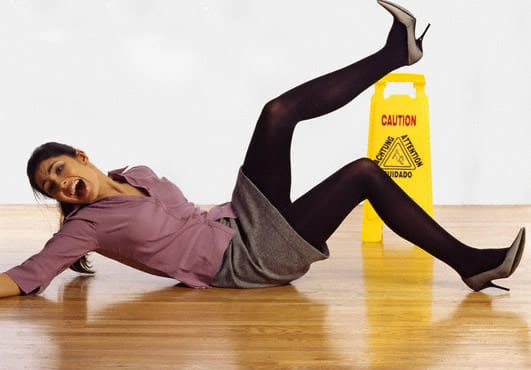
Slip-and-falls account for over eight million ER visits a year. That total easily eclipses the number of car crashes, dog bites, swimming pool drownings, drug overdoses, and other kinds of unintentional injuries. Slip-and-fall consequences are quite severe, especially for older Americans. Many of these victims never fully recover. In fact, a majority can no longer live independently after their falls.
Buffalo injury attorneys can usually obtain substantial compensation for these families. But insurance company lawyers are equally determined to reduce or deny compensation to victims. Their efforts have nothing to do with what’s right or what’s fair. These attorneys only care about the insurance company’s bottom line. So, they will use any legal loophole at their disposal.
No Legal Duty
In slip-and-fall cases, almost all victims have either express permission (“come to a meeting next Thursday”) or implied permission (“Open for Business” sign) to be on the premises. There is a significant difference between these two categories.
- Invitees confer and actual or potential benefit on the landowner. That benefit could be economic or noneconomic. The benefit need not be substantial. A window-shopper at a car dealership has the same rights as someone who buys the most expensive Italian sports car on the lot. If the victim was an invitee, the landowner has a duty to ensure that the premises are reasonably safe.
- Licensees confer no benefit on the owner. Examples include people who cut across parking lots on their way home from school or guests of hotel guests. If the victim was a licensee, the owner has a duty to warn about latent (hidden) defects, but no duty to repair them.
A few victims are trespassers (no permission and no benefit). These individuals have basically no rights in these cases.
Many insurance companies argue that invitees must confer an economic benefit on the owner. Indeed, most Minnesota courts hold that social guests are generally licensees. But that is just a presumption.
To overcome this presumption, Buffalo injury attorneys can introduce evidence about the close connection between the victim and the landowner. Perhaps the victim had been a guest on many prior occasions or the landowner testified that s/he enjoyed the victim’s company prior to the fall.
The victim/plaintiff need only establish invitee status by a preponderance of the evidence. Imagine two equally-sized stacks of paper side by side. If someone adds one sheet of paper to the stack on the right, it has more paper than the stack on the left. That’s the picture of a preponderance of the evidence.
Buffalo Injury Attorneys and Lack of Knowledge
Aside from the “no duty” argument, the “I didn’t know that” argument is probably the most common insurance company defense in these cases. Occasionally, there is a smoking gun. That could be a restroom cleaning report or surveillance video that shows an employee negligently creating the hazard. But such direct evidence is rare.
Fortunately, Brainerd injury attorneys may also introduce circumstantial evidence of constructive knowledge (should have known). Legally, constructive knowledge has the same effect as actual knowledge. To evaluate the evidence, most Minnesota courts use a variation of the time-notice rule which first appeared in 1911’s Anjou v. Boston Elevated Railway Company.
In this colorful case (no pun intended), the victim slipped on a banana peel. Significantly, numerous witnesses said that the peel was black and gritty as if it had been “trampled over a good deal.” The railway company admitted that Ms. Anjou was an invitee but denied that it knew about the hazard. To resolve the dispute, the court focused on the banana peel’s color.
- Yellow Peel: If the hazard was a recent occurrence, the owner usually had no constructive knowledge. So, if the peel was yellow and had just fallen on the floor, the owner had no duty to clean it up. The same thing applies to a non-wilted piece of lettuce on a supermarket floor or an undisturbed liquid spill.
- Black Peel: Conversely, if the hazard had been there for quite some time, the opposite is true. Constructive knowledge attaches. A diligent owner would have discovered the hazard and remedied it before someone got hurt. The duty of reasonable care requires no less.
- Brown Peel: Some peels are neither yellow nor black. So, in some cases, the victim/plaintiff must introduce additional evidence to establish constructive knowledge. For example, if the produce was freshly stocked, the worker should have seen the wayward lettuce leaf.
To establish knowledge, the same burden of proof (preponderance of the evidence) applies.
Open and Obvious Hazard
Under Minnesota law, the owner has no liability if the hazard was open and obvious. That could be a palette in the middle of a store aisle or a stairway rail that is separated from the wall.
The Minnesota Court of Appeals may have dealt this once-reliable defense a death blow in 2014’s Stock v. Garrison Y Club. The court held that an open and obvious hazard does not provide immunity as a matter of law. Instead, the insurance company must present additional evidence on this point.
That ruling makes sense. Let’s return to the loose stairway rail example. An obvious defect in daylight is essentially invisible at night or in a poorly-lit room. AGe may be a factor as well. OLder people cannot see as well as younger people. Moreover, older people cannot suddenly alter their gaits to avoid hazards that some consider open and obvious.
Rely on Experienced Buffalo MN Lawyers
Insurance company attorneys do whatever it takes to reduce compensation in slip-and-fall cases. For a free consultation with aggressive Buffalo injury attorneys, contact Carlson & Jones, P.A. Home and hospital visits are available.

